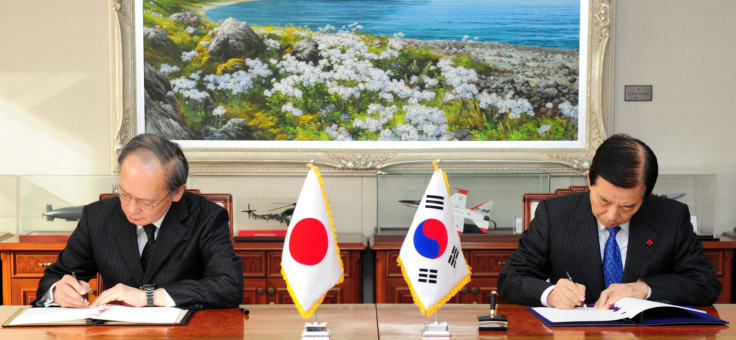China slams Japan-South Korea military intelligence sharing deal
Beijing's foreign ministry says pact between Seoul and Tokyo exposes 'cold war mentality'.

China has reacted sharply to the defence deal signed by Japan and South Korea to share military intelligence in the wake of increasing threats from North Korea. Calling the pact unnecessary, Beijing said it exposes the "cold war mentality" of the two Asian nations.
Shortly after Japan and South Korea formally agreed on the controversial and much-awaited defence deal, Beijing said the agreement, which comes into effect immediately, is bound to raise confrontation in the already divided Korean peninsula.
"The situation facing the Korean peninsula is sensitive and complicated. Relevant countries should respect security concerns of regional countries when carrying out military cooperation, instead of taking the opposite direction," said Chinese foreign ministry spokesperson Geng Shuang. The deal would inevitably "intensify antagonism and confrontation on the Korean peninsula", he added.
Tokyo and Seoul — keeping their historic differences aside — inked the accord, known as the General Security of Military Information Agreement, on Wednesday, 23 November, to share intelligence data in the face of growing military threats from their mutual adversary, North Korea. Pyongyang has so far conducted two nuclear tests and carried out more than 20 missile launches in 2016 alone.
Dubbing the step "necessary", South Korea's defence ministry said it is ready to conduct additional nuclear tests and missile launches at any time. "Since we can now utilise Japan's intelligence capability to effectively deal with North Korea's escalating nuclear and missile threats, it will enhance our security interests."
The agreement was originally to be signed in 2012, but negotiations failed following popular sentiment against it in South Korea. However, this time the deal went through despite the political scandal troubling South Korean President Park Geun-hye.
Meanwhile, the US, which has been urging its two allies to embark on the pact, has welcomed the major move between its key partners in the region. Pentagon's press secretary Peter Cook said: "We've been very supportive of efforts by South Korea and Japan to enhance their own security cooperation. We think this is an important step and a positive step. And of course, we encourage those two countries to continue their collaboration with regard to the security threats in the area."
© Copyright IBTimes 2024. All rights reserved.







